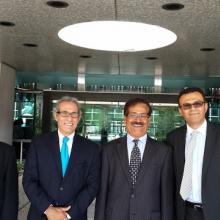Business as usual with Tehran as the interim deal unravels
In November, major world powers struck an interim deal with the regime of Islamic Republic of Iran (IRI), giving Tehran an estimated $7 billion in sanctions relief in return for steps to halt the regime’s nuclear activities. The deal called for negotiating a full agreement within 6 months, possibly a year, and gradual loosening of sanctions that many rightly believe has brought the regime to the negotiating table.
President Obama hailed the temporary agreement to freeze Iran's disputed nuclear program as a historic agreement, pushing back against skepticism of the accord voiced by members of congress and some American allies.
Opposing the interim deal, most members of Congress have argued that it was unwise to ease sanctions before Iran took aggressive action to rein in its nuclear program, which the United States and allies suspect may be aimed at building nuclear bombs. 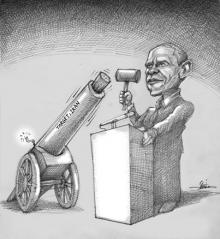 Sens. Bob Menendez (D-NJ) and Mark Kirk (R-IL) are threatening to introduce a new sanctions bill despite warnings from the Obama administration that new sanctions could derail nuclear negotiations at a delicate moment.
Sens. Bob Menendez (D-NJ) and Mark Kirk (R-IL) are threatening to introduce a new sanctions bill despite warnings from the Obama administration that new sanctions could derail nuclear negotiations at a delicate moment.
Meanwhile, Sen. Bob Corker (R-TN) has proposed the idea of putting off the planned senate sanctions for now and scheduling a vote on sanctions six months from now, however, other senators opposed his proposal. For instance, Sen. Carl Levin (D-MI) said that Corker’s proposal “doesn’t sound workable.” Sen. Lindsey Graham (R-SC) said that he is “more disturbed now” about the nuclear deal “than ever before” after a briefing with the Obama administration’s officials regarding the nuclear deal with IRI.
In their efforts, Obama administration officials insisted to a Senate panel Tuesday that a temporary sanction relief as part of the deal meant to curb IRI's nuclear program is “quiet limited and quite targeted” and that “Tehran is not open for business” not about to dismantling the existing restraints on world trade with Tehran.
Testifying before skeptical lawmakers, US Undersecretary of State for Political Affairs and the chief U.S. negotiator with IRI Wendy Sherman said Washington was warning the growing number of business delegations heading to Iran that sweeping sanctions remained in place.
Sen. Jim Risch (R-Idaho) said at Tuesday’s hearing that because some sanctions have been relaxed, America's European partners "are now flooding in there with business people … going back to business as usual with the Iranians." LA Times reported. "Whose job is it going to be to put the genie back in the bottle when this thing fails?” he further added.
Foreigners are visiting "to see what might come in the future," said in response David Cohen, a Treasury Department undersecretary and in charge of sanctions. "They're not looking to do business today." he reassured the lawmakers.
Business executives from major Western countries have visited Tehran in recent weeks, and a French delegation that arrived Monday included more than 100 potential investors. IRI officials welcomed top executives from France's biggest firms with representatives from major companies like Total, Lafarge and Peugeot on Monday, the most senior French trade mission in years.
French employers’ union vice president Thierry Courtaigne said the delegation, which arrived in Tehran Monday, wanted to assess the commercial opportunities opened up by the easing of Western sanctions.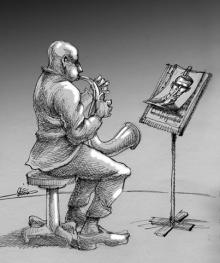
"Secretary Kerry has talked directly to Foreign Minister (Laurent) Fabius about the trade delegation ... about how this is not helpful," Under-Secretary of State for Political Affairs Wendy Sherman told U.S. lawmakers, Chicago Tribune reported.
Partly in an attempt to send a message that the United States is not relaxing economic pressures on Iran, the Obama administration penalized nearly three dozen companies and individuals in eight countries on Thursday, accusing them of evading Iranian sanctions. The announcement by the Treasury Department was the second of its kind since the deal on regime’s disputed nuclear program in November.
Despite some efforts by the administration, major world powers are moving in to seize the opportunity; a Reuters report on January 10 revealed that Iran and Russia were negotiating a $1.5 billion per month oil-for-goods swap that would enable Iran to lift oil export substantially. Several lawmakers voiced concern about the proposed oil-for-goods swap. Turkey is also poised to benefit from the sanctions relief to increase its relatively cheaper oil import from Iran in return for gold, thanks to loosened restrictions on Tehran’s gold trade.
Many of those opposed to the interim deal believe that Congress should have passed a bill, now stalled, sponsored by Senators Menendez and Kirk. They argue, the bill would have imposed additional sanctions on the regime if the interim deal expires with no prospect of further talks. As with the biting sanctions that forced the regime to concede, the new trigger sanctions might have even discouraged IRI from backing away from the interim deal as it has done in the past.
Many in the West have reacted angrily to America’s growing rapprochement with Iran, warning Iran’s supreme leader Ayatollah Ali Khamenei, who holds the reins of power, is only interested in winning relief for the hard-hit economy and the isolated regime. They also argue that the election of the apparent moderate President Hassan Rouhani also serves Khamenei’s same purpose.
This is a stark reminder of the first so-called reformist government of Mohamad Khatami in 1997 that not only prolonged regime’s existence for another eight years, but also signalled erroneous hopes for change. IRI supreme leader, Ali Khamenei eased restriction on regime critics in the presidential election (June 1997) when major European countries cut ties with IRI after a German Court implicated IRI officials at the highest level (April 1997) for the murder of Iranian-Kurdish opposition leaders in a Berlin restaurant in 1992.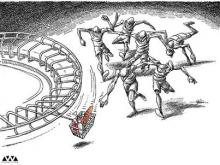 Until then, trade and commercial interest had encouraged many European governments to hold what they called a "critical dialogue" with IRI, raising at times issues of terrorism and human rights while continuing to do hefty business with the Mullahs. This policy was maintained despite criticism from the United States then, which had pursued an isolationist policy with the regime in Tehran.
Until then, trade and commercial interest had encouraged many European governments to hold what they called a "critical dialogue" with IRI, raising at times issues of terrorism and human rights while continuing to do hefty business with the Mullahs. This policy was maintained despite criticism from the United States then, which had pursued an isolationist policy with the regime in Tehran.
Now with the interim deal in the horizon, the US appears to be the main proponent of engagement with the IRI regime. Accordingly, and as the argument proceeds in Congress, there is little or no prospect of reining in the controversial nuclear weapons program - now at its most advanced stage ten years on - let alone regime’s continued support for terrorism abroad and further deteriorated human rights situation at home.
The Europeans, on one side, blinded by economic inducements, but chiefly incited by recent US rapprochement with the clerical regime, are once again busy rushing back to Iran’s capital for a lucrative market in a country ruled by a regime cheeringly busy celebrating its 35 years of dictatorial reign.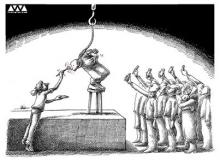 The regime’s façade yield on its nuclear issue with the West – or as IRI officials bluntly state as the “West’s surrender to Iran’s nuclear rights” - and in fact the essence of the nuclear issue, but most importantly, the sudden re-emergence of another so-called reformist president, seem to well play as an insurance policy to guarantee regime’s continued survival and business to continue as usual.
The regime’s façade yield on its nuclear issue with the West – or as IRI officials bluntly state as the “West’s surrender to Iran’s nuclear rights” - and in fact the essence of the nuclear issue, but most importantly, the sudden re-emergence of another so-called reformist president, seem to well play as an insurance policy to guarantee regime’s continued survival and business to continue as usual.
Cartoons by Mana Neyestani, Iranian Cartoonist
By : Sharif Behruz


